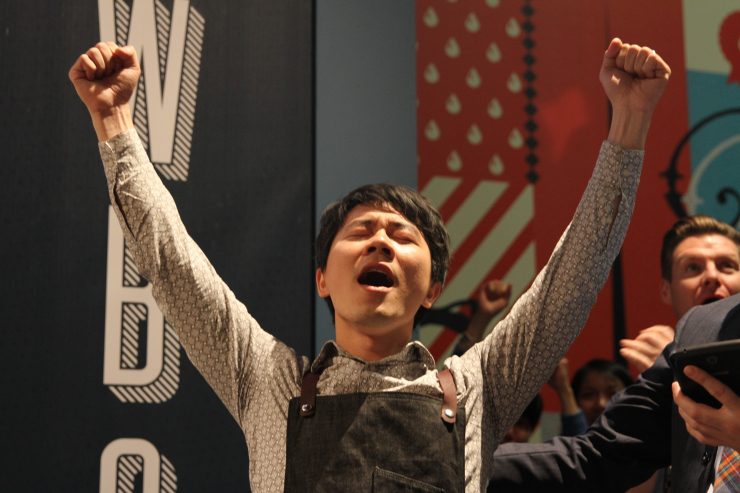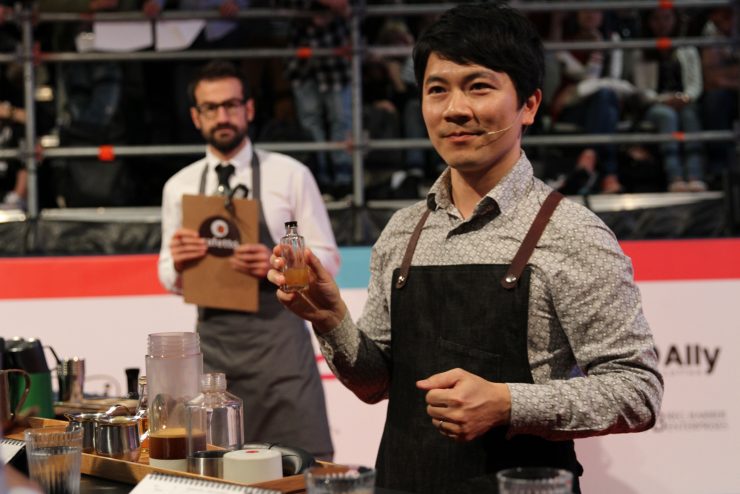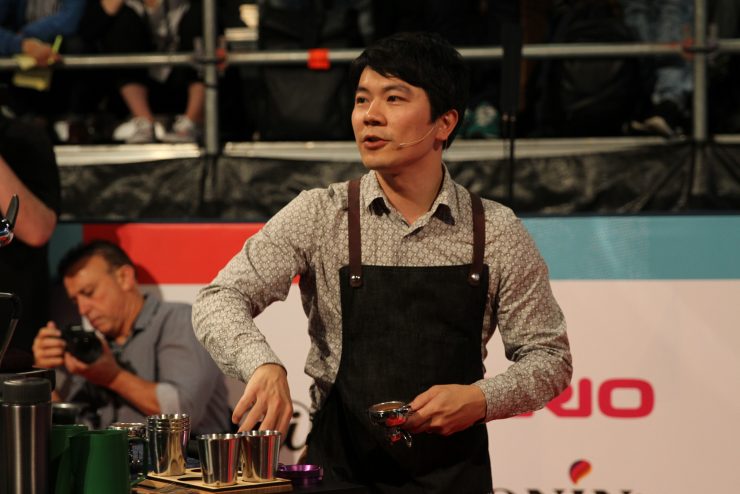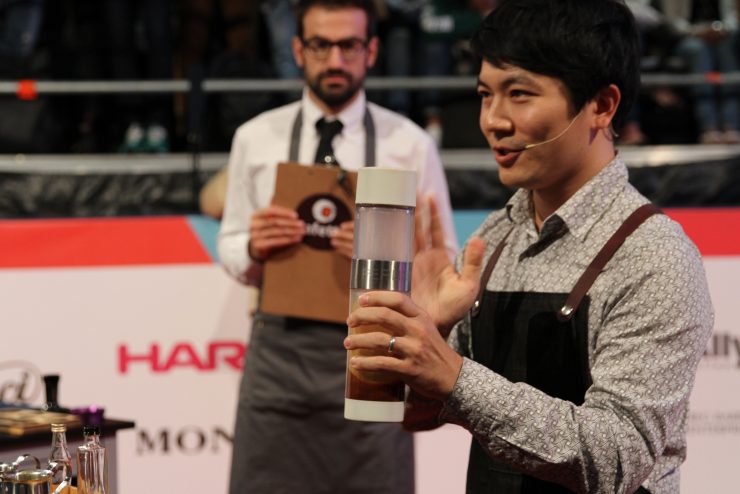On June 25th, 2016, barista competitor Berg Wu became the first person from Taiwan to win the World Barista Championship, an annual international exhibition of coffee skill staged this year in Dublin, Ireland. This was a landmark win for not just Berg Wu, but for recognition of the high quality of coffee culture in Taipei, the capital of Taiwan (officially the Republic of China). Taiwan has triumphed on the national stage once before when Pang-Yu Liu took home top honors at the 2014 World Cup Tasters Championship. Together we can see a clear trend: the establishment of Taiwan as a major force in world coffee culture.
Berg Wu is now, and forever more, a World Barista Champion. We caught with him from Taipei for his first major English-language interview following his landmark win in Dublin. Below we learn more about Simple Kaffa, Berg Wu’s cafe in Taipei, gain some insight on the unorthodox methods he used to win (portafilter ice bath, huh?), and ask his advice for future generations of competitors.
Hello Berg Wu, and congratulations again from all of us at Sprudge. First, please tell us more about your cafe, Simple Kaffa — are you a roaster as well as a coffee bar? Where are you located? What equipment do you use there? We hear you are famous for your green tea rolls…tell us more, please!
My coffee shop, Simple Kaffa, is “hidden” in a selective shop in a basement, making it a little bit difficult to find. Some magazines even list us as one of the most hidden coffee shops in Taipei. But the location is actually good because it is in a very popular shopping area in Taipei. Due to the limitation of the place, we are not roasting our coffees there. We placed our roaster, which is now a Diedrich 5kg, in another place. In our coffee shop, we have a La Marzocco GB5 espresso machine with two group heads, and Mahlkonig EK43 and La Marzocco Swift grinders. We use other grinders such as Anfim, Robur, Vario K30 Air, Major, etc., in the roastery for training and other usages.
We started our coffee shop in 2011 but it didn’t go well in the first year. Specialty coffee is a trend but not part of the culture yet. Desserts, or afternoon tea, on the other hand, attract more people’s attention than coffees. So we started to try to make desserts by ourselves based on our limited skills of baking. The matcha roll is one example of success. We think one reason is that we tried at least 8 kinds of matcha tea and made 8 rolls and invited friends to come and “cup” those matcha rolls. We let them vote for their favorites and then we decided to use the most loved one. The process was fun.
Simple Kaffa has become a place where people will come when they need a cup of good coffee with a piece of nice cake.
You have competed at the World Barista Championship before — what made this year different?
This year we were fully aware of various situations we might encounter in a world competition. The milk, the grinder, the temperature, and humidity of Dublin. Take the milk for example. We’ve been struggling with milk since the WBC in Rimini 2014, because in Taiwan, most of the milk is UHT. We were not capable of testing various milk from small dairies and immediately finding the milk that might work the best for our coffee. So for this purpose, we purchased almost all milk we can find in Taiwan and tried to improve with our ability of milk cupping.
![Berg Wu competing in 2014. [File Photo]](http://sprudge.com/wp-content/uploads/2014/06/Taiwanese-Barista-Champio-Tse-Lin-Berg-Wu-7671-740x493.jpg)
Berg Wu competing in 2014. [File Photo]
I am very proud. Because this is a way to let the world know the potential of coffee industry in Taiwan. Although we still consume more tea than coffee, the industry is getting mature. The “coffee impression” of a city matters to us when we travel. And I really hope that the world can now have a very good coffee impression on Taiwan now. Not just dumplings, night markets, and foot massage.
We are very curious about one of your techniques — soaking your portafilter in cold water before pulling espressos. Tell us about why you did this, and what was your research process to reach this decision? Was the water flavored in any way?
This method is just for this coffee, which is full of delicate aromas of flower and citron. These kind of aromas are small molecules and disappear very quickly when being heated. That’s why we didn’t want the espresso to be re-heated by the bottom of the portafilter after extraction. This method might work for other floral, light, refreshing coffees, but might not suit for coffees with bigger molecules of aroma. So we flipped the portafilters over and poured the iced water mainly on the bottom and the spout, where espresso touches after being extracted.
The bottom of the portafilter is just cold, not chilling cold. Our intention was not to cool down the espresso. We were just trying to avoid the espresso being reheated. And the last question is interesting—we’ve never thought about this, but no, the iced water is not flavored. It’s just normal drinkable water because our intention is to decrease the temperature to showcase what has already in it, not adding flavors to it.
You served just 0.3cm of microfoamed milk in your milk drinks — why did you make this choice?
To be honest, if the rules allow it, we would rather not to pour any foam because this coffee is very delicate and complicated in flavors and I think foam will hinder a person from sensing those delicate flavors. For us, 0.3cm offered a perfect balance between taste and latte art.
Tell us more about your winning coffee, please.
The coffee I used is a 2015/2016 crop of washed Geisha from Finca Deborah, Panama. Deborah is a very new farm because this is just their second year of exporting Geisha. This farm is very special because we all know that elevation is a key factor in coffee quality and its elevation is 1950 meters above sea level. I respect the producer, Jamison Savage, very much because creating Deborah at this elevation, and in such isolation and against so many odds has been a great challenge. We believe a focused dedication and a commitment to quality are keys to their success.
Deborah gives something very unique that nobody can identify. It’s in the finish and leaves a beautiful lingering aftertaste that comes and goes for hours. Very honey-like, but unmistakably floral. The coffee also contains an entire bouquet of flowers, like the farm, as well as fruits (dark and tropical), but the cup is round and not one particular flower reveals itself in any obvious way—except for perhaps the coffee flower. It’s elegant in this way, unlike so many other coffees. The complexity is so high that I am very addicted to it myself.
Wow, that sounds incredible. How did you adapt such a fascinating coffee for your signature drink? And where did the idea of using an oil diffuser come from?
I like this coffee’s complexity very much. I like its aroma and juiciness in shorter extraction and I also like its long and lingering finish in longer extraction. This coffee makes me realize there are things that a barista cannot do with an espresso because we are just trying to sacrifice less. But with this signature drink, I am able to showcase all nice aspects of this coffee’s complexity. As for the oil diffuser, we all like aromas but I think aromas are mostly nasal and disappear very quickly. So I wanted the aroma to become flavor by infusing the drink with pressure.
Who would you say has been your greatest inspiration as a barista competitor?
That will be Gwilym Davies because he was very humble and calm. When I watched him competing, I wish that someday I can be as calm as he was on the stage.
![Gwilym Davies [File Photo]](http://sprudge.com/wp-content/uploads/2014/04/gwilym-2-640x426.jpg)
Gwilym Davies [File Photo]
Have faith in yourself and your team, set up a goal and try to solve the problems ahead one by one. Whenever you feel lost or helpless, try to remind yourself of that goal. Don’t forget why you compete.
Do you have anyone you would like to thank?
My wife, Chee. She is not just my wife but also my coach, my life partner, my mentor, and my best friend.
Thank you so much, Berg Wu!
Sprudge Media Network’s coverage of the 2016 World Barista Championship was made possible by direct support from Urnex Brands, Nuova Simonelli, and KitchenAid.
The 2016 World Barista Championship lives at SprudgeLive.com, the worldwide leader in coffee sports.
The post World Barista Champion Berg Wu: The Sprudge Interview appeared first on Sprudge.
seen 1st on http://sprudge.com



No comments:
Post a Comment